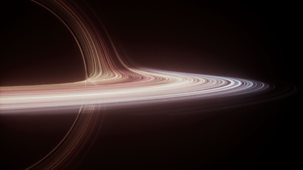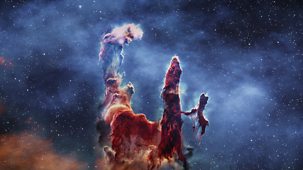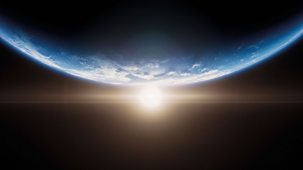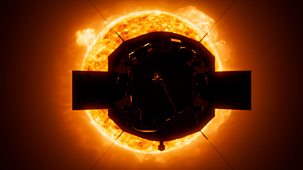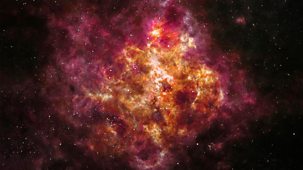
Series 1: 5. The Big Bang: Before the Dawn
Professor Brian Cox asks the ultimate question: how did the universe come to be? It is daunting in its scale. We live on one planet of eight that orbit just one of the 400 billion stars in our galaxy, which in turn is one of trillions in the universe. Yet it is amongst those galaxies that we have been able to unravel the story of the universe’s creation. Thanks to a series of discoveries, our most powerful space missions have unravelled 13.8 billion years of cosmic evolution and revealed the story of our universe from its birth all the way to the arrival of our nascent civilisation. \n\nOur guide on this odyssey back to the dawn of time is light. Telescopes are time machines - by looking out into the distant universe, they open a window to the past. One telescope more than any other has helped us journey through the history of the universe: NASA’s Hubble Space Telescope. Over the course of three decades, Hubble has shown us cosmic evolution in action – including stars and planets being born and galaxies colliding. Remarkably, Hubble has even found one of the first galaxies ever to exist in the universe, which was born some 13.4 billion years ago. It's a discovery that hints at the beginnings of our own Milky Way. Vivid CGI brings this ancient galaxy to life, allowing us to witness for ourselves the first dawn. It was the beginning of a relationship between stars and planets that would, on a faraway world, lead to the origin of life - and ultimately to us.\n\nHubble’s incredible discoveries have allowed scientists to piece together much of our cosmic story, but it cannot take us back to the most important moment in history: the Big Bang. For decades, the moment the universe began was the subject of pure speculation, but by combining astronomy and cosmology, scientists have finally found a way to put their theories to the test and study the momentous events that took place during the Big Bang. They can do this because the European Space Agency’s Planck space telescope has seen the afterglow of the Big Bang itself – something we call the cosmic microwave background. The unparalleled detail Planck gave us has helped confirm something remarkable: the Big Bang may not be the beginning. There was a time before the dawn – a place beyond anything we can comprehend. Brian transports us back to the fraction of a second before the Big Bang, when the seeds of our universe were planted. \n\nThe story of our universe's origin is an improbable odyssey, one that helps us understand how we came to be here, contemplating this vast cosmic drama.
Source: BBC 2
Most recent episodes of Universe
Universe
Series 1: 5. The Big Bang: Before The Dawn
Professor Brian Cox asks the ultimate question: how did the universe come to be? It is daunting in its scale. We live on one planet of eight that orbit just one of the 400 billi ...
01-08-2025
BBC 2
Universe
Series 1: 4. Black Holes: Heart Of Darkness
Professor Brian Cox continues his epic exploration of the universe with a journey into darkness. The centre of our galaxy is home to an invisible monster of unimaginable power & ...
31-07-2025
BBC 2
Universe
Series 1: 3. The Milky Way: Island Of Light
Professor Brian Cox continues his epic exploration of the cosmos by looking at the faint band of light that sweeps across the night sky - our own galaxy, the Milky Way. The Sun ...
30-07-2025
BBC 2
Universe
Series 1: 2. Alien Worlds: The Search For Second Earth
Humans have long gazed up at the night sky, wondering whether other lifeforms and intelligences could be thriving on worlds far beyond our own.\n\nAnswering that question seemed ...
29-07-2025
BBC 2
Universe
Series 1: 1. The Sun: God Star
Professor Brian Cox begins his epic exploration of the cosmos with a hymn to the great luminous bodies that bring light and warmth to the universe: the stars.\n\nIt is estimated ...
28-07-2025
BBC 2
Most popular episodes of Universe
Universe
Series 1: 1. The Sun: God Star
Professor Brian Cox begins his epic exploration of the cosmos with a hymn to the great luminous bodies that bring light and warmth to the universe: the stars.\n\nIt is estimated ...
28-07-2025
BBC 2
Universe
Series 1: 4. Black Holes: Heart Of Darkness
Professor Brian Cox continues his epic exploration of the universe with a journey into darkness. The centre of our galaxy is home to an invisible monster of unimaginable power & ...
31-07-2025
BBC 2
Universe
Series 1: 5. The Big Bang: Before The Dawn
Professor Brian Cox asks the ultimate question: how did the universe come to be? It is daunting in its scale. We live on one planet of eight that orbit just one of the 400 billi ...
01-08-2025
BBC 2
Universe
Series 1: 2. Alien Worlds: The Search For Second Earth
Humans have long gazed up at the night sky, wondering whether other lifeforms and intelligences could be thriving on worlds far beyond our own.\n\nAnswering that question seemed ...
29-07-2025
BBC 2
Universe
Series 1: 3. The Milky Way: Island Of Light
Professor Brian Cox continues his epic exploration of the cosmos by looking at the faint band of light that sweeps across the night sky - our own galaxy, the Milky Way. The Sun ...
30-07-2025
BBC 2


